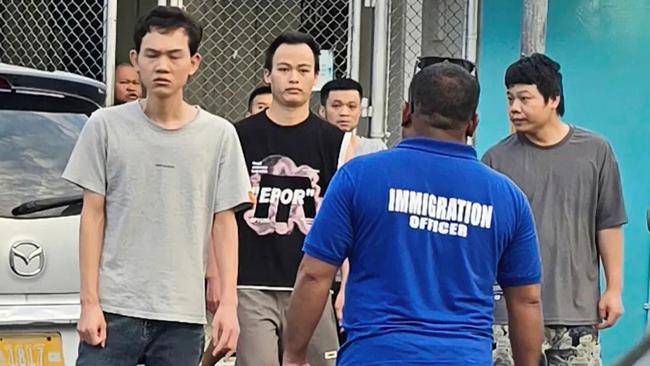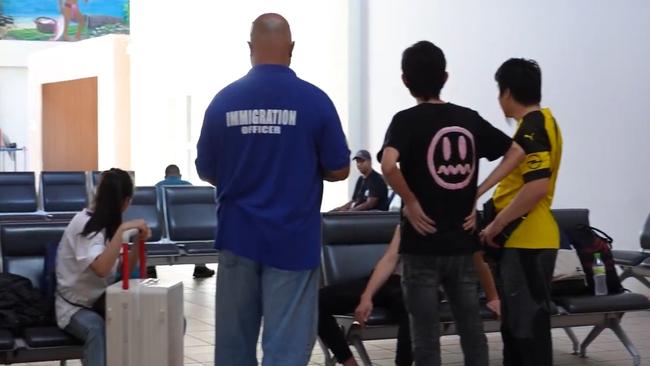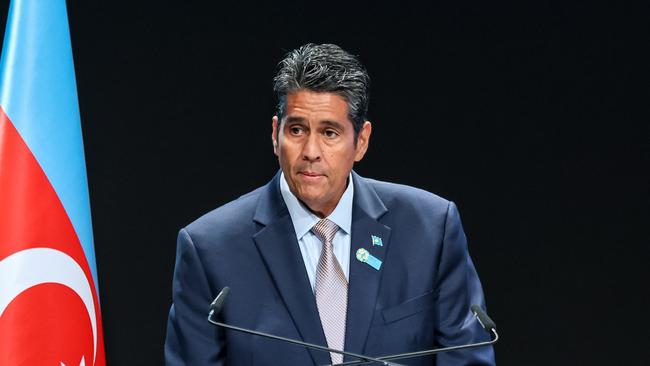Pacific minnow of Palau taking on Chinese organised crime, influence
A quiet revolution has been unfolding on the island nation of Palau that has seen the dismantling of Chinese-run illegal gambling, online scam operations, drug smuggling, and money laundering networks.

A quiet revolution has been unfolding in the tiny northern Pacific Island nation of Palau, a country many Australians may never have heard of but which has taken an unprecedented stand against Chinese criminal networks and malign political influence.
It is hard to overstate the degree to which the archipelagic nation of barely 20,000 people has punched above its weight in recent months following a presidential directive that has seen the dismantling of Chinese-run illegal gambling, online scam operations, drug smuggling, human trafficking and money laundering networks — nor the example it has set fellow Pacific Island nations also battling rising transnational organised crime.
The December 2024 presidential order granted Palau’s National Security Coordinator 90 days to vet all visa applications, crosscheck them against INTERPOL’s criminal database, validate employment histories and weed out high-risk applicants.
Dozens of Chinese nationals have been deported since January, including two previously convicted in New York for bribing officials to set up a controversial special economic zone in the Marshall Islands (which, like Palau, still officially recognises Taiwan), and another implicated in Singapore’s largest money laundering case earlier this year, wrote Cleo Paskal, a non-resident senior fellow at the Foundation for Defence of Democracies, in a widely-syndicated article this week.

Some 65 more Chinese nationals’ visas have been cancelled or rejected.
“It appears the PRC is sending its folks to Palau to work in these online scamming centres,” Palau’s National Security Coordinator Jennifer Anson said in late March as yet another group of Chinese citizens was deported.
The Palau government has been careful not to point the finger directly at Beijing given China’s economic importance to the nation.
But Palau President Surangel Whipps Jnr, in Sydney this week for a climate conference and to give Thursday’s annual Lowy Institute Pacific Island Leaders address, said in a recent television interview he believed organised crime infiltrating Palau was “aimed at weakening us as a nation”.

The former Japanese colony was instrumental to Japan’s ability to attack Pearl Harbor in 1941, and Washington’s conviction it needed to increase its presence in the Pacific.
As one of three northern Pacific Island nations that make up the 1983 Compact of Free Association States, with the Marshall Islands and Federated States of Micronesia, Palau is one of the US’s closest partners in the Pacific.
The agreement entitles the citizens of all three COFA states to live and work in the US and access government services at domestic US rates and commits Washington to defend them from attacks or threats while in return allowing it to set up military facilities there and block other countries’ militaries from operating within their borders.
But whether the US is still living up to its end of the bargain is up for debate given the uptick in Chinese-led criminal activity Palau has faced in recent years.
Lowy Institute Pacific Islands program director Mihai Sora told The Australian: “Palau’s sustained resistance against transnational criminal networks looking to launder money or expand drug trade routes is as remarkable as the meagreness of US support to the tiny nation for complex law enforcement and cybercrime operations”.
The island’s only cybercrime expert has been funded through the Australian government.
As the US has been gradually refurbishing old airstrips and building up its military facilities in Palau, Chinese investment has also spiked with some new entrants leasing land in strategic locations.
But so too has Chinese-linked crime. Palau has also been hit by Chinese cyber attacks and has regularly recorded Chinese research vessels entering its exclusive economic zone.
China has rejected allegations it uses organised crime as coercion but Mr Sora says there is a clear a pattern of “criminal networks building relationships with government officials and political decision makers in countries where they set up shop”.
“They build themselves into the political ecosystem of these countries and establish those relationships as a precursor to government-to-government connections,” he said. “These figures are already up to their knees in it by the time they get a knock on the door by a Chinese diplomat offering a great deal.”
In a tight-knit society such as Palau, that can be even more problematic given one official’s corruption can compromise entire family and community networks.
Center for Strategic and International Studies inaugural Australia Pacific chair Charles Edel told The Australian that Mr Whipps had been an outspoken regional voice on the malign influence of certain Chinese entities within his country and his actions had “clearly set an example that others could pursue”.
“Chinese crime is certainly a pervasive concern of (Pacific Island) policymakers and Chinese statecraft often flourishes under conditions that enhance corruption,” Mr Edel said.
Ms Paskal, too, says the country’s actions had given a “masterclass” in how a small nation may address the serious national security threat posed by Chinese criminals whose activities may create an opening for Beijing’s influence machine.
“Palau is showing you can fight back, no matter your size,” she said.




To join the conversation, please log in. Don't have an account? Register
Join the conversation, you are commenting as Logout